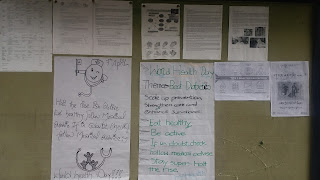 |
| Beat Diabetes |
Darla school celebrated World Health Day. The day was marked with many
health and hygiene-related activities. In the morning, we had the day’s speech
by the health club members, and there the music was played about a healthy
song. In the afternoon, the health staff of Darla was requested to give a talk, and
upon our request, three staff came and gave wide coverage of health and hygiene
issues and care. Teachers and Students from classes VI to 10 gathered in the MPH
for the talk. Two health teachers gave a basic health talk to the students of
class pp to V in the assembly ground. They also cleaned toilets, water tank,s and
water sources. The photos below tell the story of the whole thing.
 |
| Giving speech |
This was the speech delivered on
that day. “Today, 7th of April is World Health Day. It is celebrated every year on the founding day of the
World Health Organization. Established in 1950 this event has a theme each year
to draw attention to a current world health issue. On this day, we remind
ourselves to take some extra steps to care for your health, spread the news of
health and threats, and inform the important issues of global health.
This year, WHO is focusing the World
Health Day, on beat diabetics.
 |
| Listening passionately |
Diabetes
is a serious, chronic disease that occurs either when the pancreas does not
produce enough insulin or when the body cannot effectively use the insulin it
produces. In 2008, an estimated 347 million people in the world had
diabetes and the prevalence is growing, particularly in low- and middle-income
countries.
In 2012, the disease was the direct
cause of some 1.5 million deaths, with more than 80% of those occurring in low-
and middle-income countries. WHO projects that diabetes will be the 7th leading
cause of death by 2030.
There are 2 main forms of diabetes. People with type 1 diabetes typically make none of their own insulin
and therefore require insulin injections to survive. People with type 2
diabetes, the form that comprises some 90% of cases, usually produces their own
insulin, but not enough or they are unable to use it properly. People with type
2 diabetes are typically overweight and sedentary, 2 conditions that raise a
person’s insulin needs.
Over time, high blood sugar can
seriously compromise every major organ system in the body, causing heart
attacks, strokes, nerve damage, kidney failure, blindness, impotence and
infections that can lead to amputations. It
was observed that 2.5% of the population (Male: 2.8%, Females: 2.1%) were known
diabetics in Bhutan.
A large proportion of diabetes cases
are preventable. Simple lifestyle measures have been shown to be effective in
preventing or delaying the onset of type 2 diabetes. Maintaining a normal body
weight, engaging in regular physical activity, and eating a healthy diet can
reduce the risk of diabetes.
The main goals of the World Health
Day 2016 campaign will be to:
- Increase
awareness about the rise in diabetes, and its staggering burden and
consequences, in particular in low-and middle-income countries;
- Trigger
a set of specific, effective, and affordable actions to tackle diabetes.
These will include steps to prevent diabetes and diagnose, treat and care
for people with diabetes; and
- Launch
the first Global report on diabetes, which will describe the burden and
consequences of diabetes and advocate for stronger health systems to
ensure improved surveillance, enhanced prevention, and more effective management
of diabetes.”
 |
| Health talks by Darla BHU staff |
 |
| And it begins |
 |
| Wide coverage of topics |
 |
| How to? and What to? |
 |
| What is H1N1 and others...? |
 |
| Demonstrating practically |
 |
| MHM and care |
 |
| Our health board with various messages |
 |
| Students cleaned the water tank |












yeezy boost 350
ReplyDeletegoyard
jordan shoes
jordan 13
air jordan travis scott
jordan shoes
golden goose usa
yeezy shoes
yeezy
golden goose